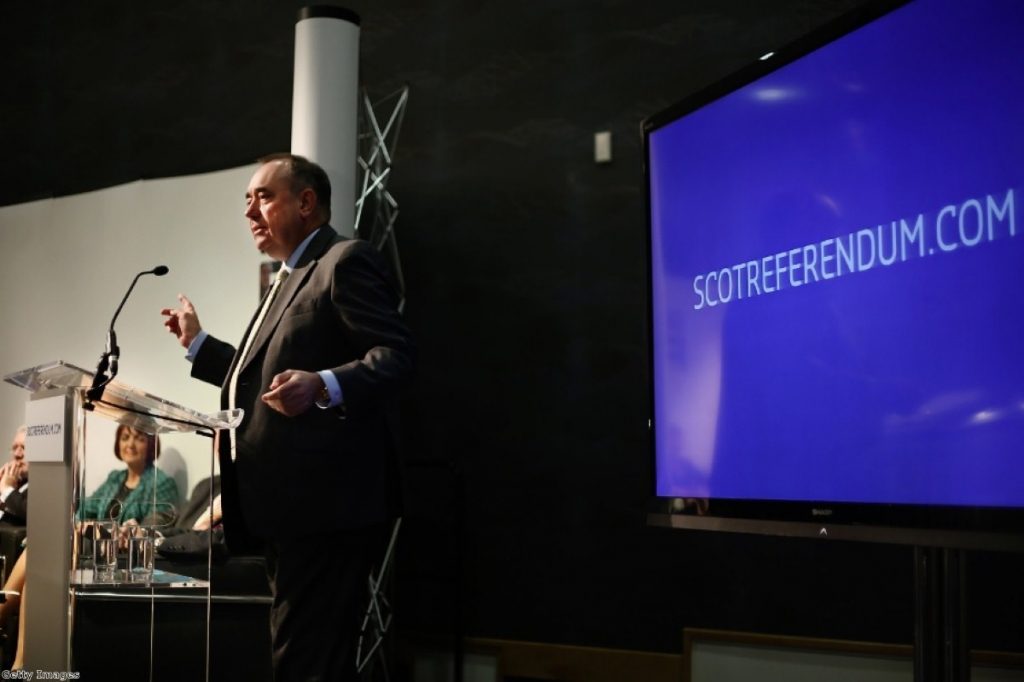The tyranny of the cybernats: Is online aggression hurting Scottish independence?
All throughout this long, long Scottish independence referendum campaign, nothing has really succeeded in shutting up the incessant trolling of the 'cybernats'. Nationalists have never been the kind to realise that less is more.
First they were a blessing, then a curse. For many years Alex Salmond could rightly feel grateful for the strength of feeling with which his nationalist agenda was voiced on social media. The only problem with the vociferous band of online cybernats, as Labour peer George Foulkes labelled them in 2009, was that they sometimes let their passions get in the way of decent manners.
All this year the media have slowly been turning their gaze northwards to Scotland, ahead of the independence referendum vote on September 18th.
In between arguments over the issues that actually matter – defence, currency union, whether Scottish TV viewers would still get to watch Doctor Who – the two campaigns have enlisted celebrities to back their cause.


The correct tactic of the nationalists here should have been to keep quiet. Just because you've written a bestselling series of children's books about wizards doesn't make you an authority on what is best for Scotland. But the cybernats couldn't help themselves. And when they called JK Rowling a "bitch", a "traitor", a "whore" and a "union cow bag", a line had been crossed.
Ordinary people care a little bit about politics and quite a lot about celebrities. So as more and more people off the telly popped up to voice their humble opinion that maybe it might be a good idea if Scotland stuck with the rest of the UK, the waves of online abuse from the cybernats only damaged their cause all the more.
Olympic gold medallist Chris Hoy was branded a "creep" and an "imbecile". Broadcasting legend Bruce Forsyth was dismissed as a "creepy old man" with a "horrible moustache". Rock superhero David Bowie was told to "f*** off back to Mars" after using his Brit Awards acceptance speech to oppose Scottish independence. Summing up the intellectual level at which many of the cybernats operate, comedian Eddie Izzard was accused of being a reptile in disguise "because Izzard rhymes with lizard".
All very unfortunate. And the SNP high command realised this. That's why they have tried hard to try and get the message out that while these attacks might be hurting the feelings of some famous people, they're doing a lot more damage to the nationalist cause.
Try as their leaders might, nothing was going to stop the cybernats from pouring every ounce of their hostility towards Better Together during the two televised debates between Salmond and Alistair Darling. For many, the real-time online war accompanying the exchanges was even more important than the debate itself.
Shoddy debate shows Darling is a one-trick pony http://t.co/OHCFXlQBLS #indyref #Indyrefdebate pic.twitter.com/kjnDgsPndf
— politics.co.uk (@Politics_co_uk) August 26, 2014
"Much like the earlier debate between Nick Clegg and Nigel Farage, it was overwhelming boos for both candidates," says the Demos think-tank's Carl Miller, who analysed the first debate. His team's Twitter monitoring found Salmond got the better of Darling – but this particular result might have been settled before the debate even got started.
"On every single metric that you'd care to measure, the yes campaign is head and shoulders above Better Together, in terms of social media likes, followers, friends, Twitter followers, number of tweets about them, people talking about them on Facebook," Miller says.
"They started much earlier and they built a really significant lead. So the reason we've heard much more about them is because they're much more prominent. There are more of them."
Strength in numbers is obviously a factor – and it's important to note, too, that trolling isn't done exclusively by one side. Salmond and his deputy, Nicola Sturgeon, have been targeted by some vicious abuse. But the 'uni-trolls' have never really come close to achieving the sustained level of hostility drummed up by their opposite numbers. "The cybernats might be this nasty, marginal, vocal base," Miller adds, "but I don't think it's won them any votes".
Meanness won't – but, as the cybernats' #PatronisingBTWoman triumph shows, mockery just might.
Journalists always like to use the phrase 'spectacularly backfired' and were given a superb opportunity to do so by the Better Together campaign video 'The woman who made up her mind'. This rather insipid attempt at winning over the female vote was ripe for ridicule and duly received a bucketload of sarcastic jeering from the cybernats.
There wasn't any derision, contempt or name-calling here. Instead the cybernats switched their approach – and it worked. The memes were particularly good…
Oh well #patronisingBTlady #patronisingBTwoman pic.twitter.com/66SYUp5v8Z
— Jo Lindsay Walton (@jolwalton) August 27, 2014
#indyref #patronisingBTWoman pic.twitter.com/ABpxWy6djw
— Kazzia (@KazzJenkins) August 27, 2014
Ha! Brilliant! #PatronisingBTWoman https://t.co/J51Z9ePi7d
— michaelina jakala (@michaelinaj) August 29, 2014
They've been aggressive and unpleasant for years, shouting at a mostly already politicised audience who made up their minds ages ago. Offending celebrities gave them the opportunity to actually lose votes for the yes campaign. But in finding more appealing ways to make the most of their online clout, the cybernats seem to have finally hit on a winning formula.
The polls are narrowing as referendum days approaches. As more and more voters start to pay attention, it's not a bad time for the cybernats to have finally got their game together.
But temperatures are rising in the remaining days of the campaign. With each day passing, the stakes for every online tussle are getting higher and higher. It's going to be tough for those believing in independence to keep their cool in the run-up to September 18th…












